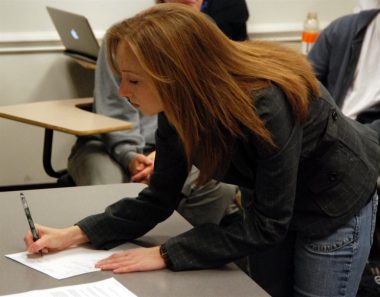Students who worked the front lines during Wilmington, North Carolina’s early switch to digital television are asking NBC president Jeff Zucker to interrupt the Super Bowl with a 30-second message from the Federal Communications Commission in the lead up to the nationwide transition on February 17, 2009.

The letter will be shipped overnight, along with a draft of the copy for the 30-second television spot they believe should be broadcast to help ready the nation for digital television. The class believes that educating the massive Super Bowl just two weeks before the nationwide switch is key to a seamless DTV transition.
“After looking at the work ahead to ensure the remaining households are ready for the switch, it is clear the next few months are critical,” said senior Maura McGrath. “This is especially true in markets where a significant number of homes still rely on over-the-air television.”
“You have to educate the television audiences when they are watching television,” said Bryan Rogala, a student in the broadcasting class. “That means interrupting their favorite television programs, even if it is for only 30 seconds.”
Rogala argues it would be better to interrupt the Super Bowl for 30 seconds than have a number of households without any television programs in the days following the transition. After studying the DTV transition and engaging with Wilmington residents still not ready for the switch, students are cautiously optimistic.
“We will have some interruptions, but the wide majority of Americans are ready. The issue is the final homes that need to transition are in our most vulnerable populations—the elderly and the poor,” said Book, who serves as associate dean for Elon’s School of Communications. “Broadcasters and local communities need to be prepared to help these households on Feb. 17.”


